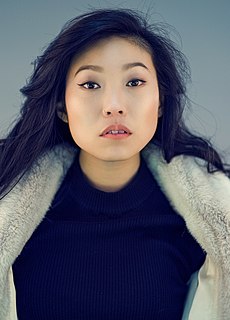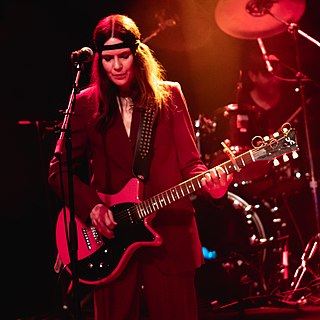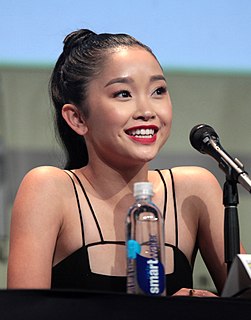A Quote by Awkwafina
I feel that its important for me to be out there and to represent the face. At the same time, for me as an individual, I think the Asian-American face can be crowded with the American identity.
Related Quotes
I always feel like people misunderstand the difference between an Asian story and an Asian-American story. That's completely different, too. I have friends who grew up in Asia, and our experiences are so different. Even though we might look the same, I feel like being Asian and then being Asian-American is completely different.
I wish people wouldn't just see me as the Asian girl who beats everyone up, or the Asian girl with no emotion. People see Julia Roberts or Sandra Bullock in a romantic comedy, but not me. You add raceto it, and it became, 'Well, she's too Asian', or, ‘She's too American’. I kind of got pushed out of both categories. It's a very strange place to be. You're not Asian enough and then you're not American enough, so it gets really frustrating.
Does people not asking me about Asian American literature mean they don't see it as its own literary tradition? I certainly believe in it as its own literary tradition, because your race plays a great factor in how you are seen by the world, and how you see the world; the fact that I'm an Asian American isn't incidental to who I am as a writer. Where it becomes difficult is defining what, if anything identifiable at all, makes an Asian American book an Asian American book, other than the fact of its creator being Asian. And I'd argue that there is nothing identifiable beyond that.
I don't feel bad or scared about getting older in terms of my looks or anything like that. I'm not afraid of my face changing. I enjoy seeing my face change. I think it's really interesting. I wouldn't want to have same face for my whole life. It would be boring to look at the same face in the mirror for 80 years.
I wish reporters were more in tune to the difference between the Asian experience and the Asian-American experience. I think often they lump the two together and think that when I talk about Asian-American narratives that they can cite 'Crouching Tiger, Hidden Dragon' or 'Mulan' as proof of concept when it's a different experience.
I am honored to have Ajamu Baraka as a running mate. I think he brings enormous credibility in the disenfranchised communities, not just African American but Latino, Asian American and Native American. He is a recognized advocate for racial justice, economic justice and human rights, and I think this conversation is only just begun. It is very important.




































